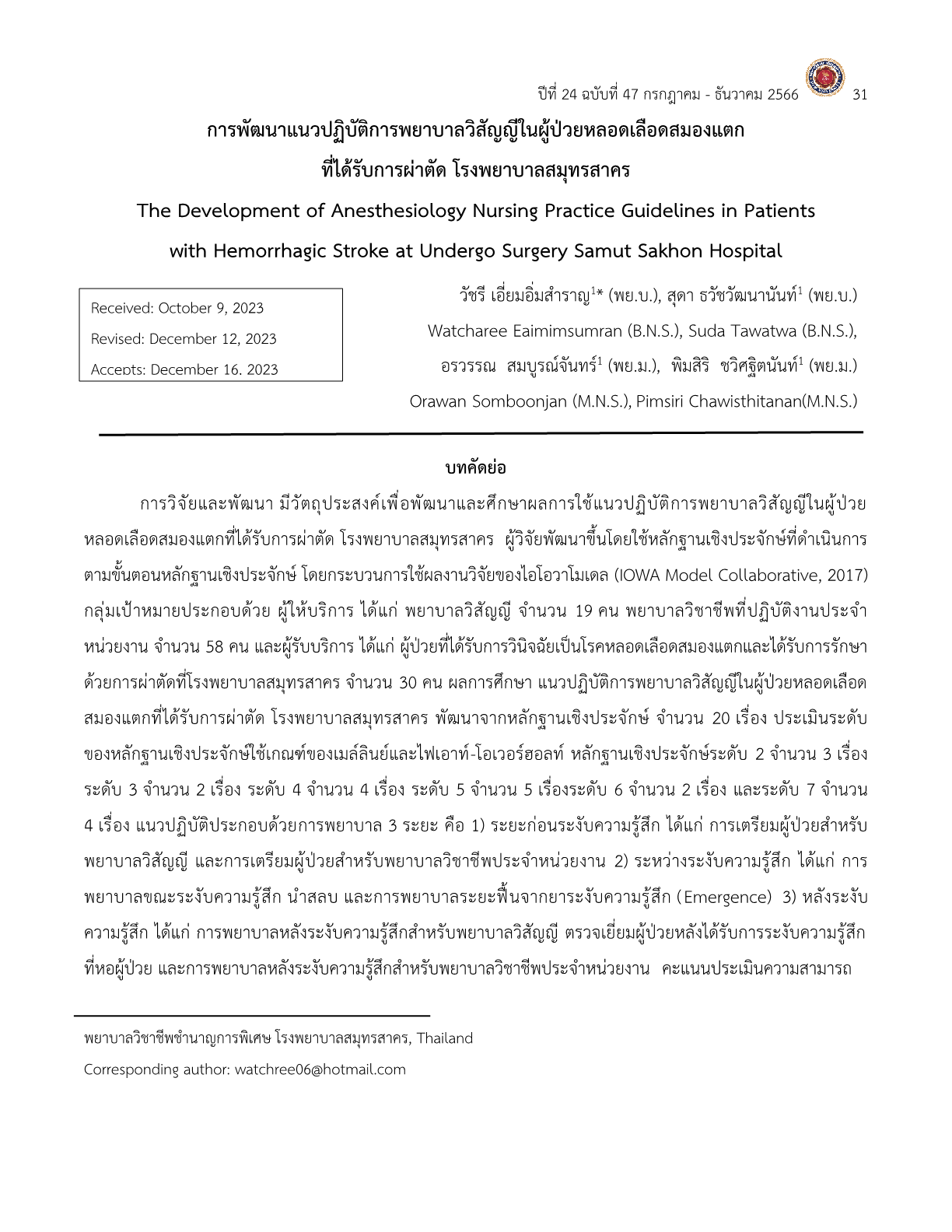The Development of Anesthesiology Nursing Practice Guidelines in Patients with Hemorrhagic Stroke at Undergo Surgery Samut Sakhon Hospital
Keywords:
Practice guidelines, anesthesia nursing, patients with hemorrhagic, strokeAbstract
This research and development aimed to develop and study the results of using anesthesia nursing practice guidelines in patients with hemorrhagic stroke has undergone surgery at Samut Sakhon Hospital. The researcher developed it using empirical evidence that was conducted accordingly. Empirical evidence steps by using the research results of the IOWA Model (IOWA Model Collaborative, 2017). The target group consists of service providers, including anesthesia nurses, 19 people, professional nurses working in unit, 58 people, and service recipients, including patients who have been diagnosed, 30 people had hemorrhagic stroke and were treated with surgery at Samut Sakhon Hospital. Results of the study: Anesthesia nursing practice guidelines for patients with hemorrhagic stroke has undergone surgery at Samut Sakhon Hospital developed from empirical evidence in 20 cases. Evaluate the level of empirical evidence using Mellin’s criteria. And power out – overhaul Empirical evidence Level 2:3 stories. Level 3:2 stories, Level 4:4 stories, Level 5:5 stories, Level 6:2 stories, and Level 7:4 stories. The practice guideline consists of nursing 3 phases: 1) the pre-anesthesia phase; Including preparing patients for anesthesia nurses. and preparing patients for professional nurses in the unit. 2) during anesthesia; Including nursing during anesthesia, anesthesia, and nursing during recovery from anesthesia. 3) after anesthesia; Including post-anesthesia nursing for anesthesia nurses, visit patients after receiving anesthesia in the ward. and post-anesthesia nursing for professional nurses in the unit. Evaluate the practical ability of anesthesia nurses in the unit at a high level when used by service recipients who are patients with hemorrhagic stroke of the 30 people who received surgery, no incidence of discrepancies was found in postponing surgery not ready and unplanned transfer to intensive care unit and no complications were found from the suppression of feelings.
References
กองโรคไม่ติดต่อ สำนักสื่อสารความเสี่ยงและพัฒนาพฤติกรรมสุขภาพ กรมควบคุมโรค.(2565) ข้อมูลโรคไม่ติดต่อhttp://www.thaincd.com/2016/mission3.
ฉวีวรรณ ธงชัย. (2548). การพัฒนาแนวปฏิบัติทางคลินิก. วารสารสภาการพยาบาล. 20(2), 63-76.
พฤทธ์ ประพงศ์เสนา. (2558). ความปลอดภัยของผู้ป่วยวิสัญญี. ใน อักษร พูลนิติพร. มานี รักษาเกียรติศักดิ์, พรอรุณ เจริญราช และนรุตม์ เรือนอนุกูล. บรรณาธิการ. ตำราฟื้นฟูวิชาการวิสัญญีวิทยา. พิมพ์ครั้งที่ 1.(431-438). กรุงเทพฯ: ราชวิทยาลัยวิสัญญีแพทย์แห่งประเทศไทย.
วิภารัตน์ จุฑาสันติกุล, ยุพิน อภิสิทธิวงศ์, อำพรรณ จันทโรกร, และนลินี โกวิทวนาวงษ์ (2560). การพัฒนาและประเมินประสิทธิผลการใช้แนวปฏิบัติทางคลินิกการพยาบาลสำหรับผู้ป่วยโรคอ้วนที่ได้รับการระงับความรู้สึกแบบทั่วตัวในโรงพยาบาลสงขลานครินทร์. ศรีนครินทร์เวชสาร. 32(2), 127-134.
สถาบันประสาทวิทยา. (2562). คู่มือการดูแลผู้ป่วยโรคหลอดเลือดสมองแตก.กรุงเทพฯ: บริษัทธนาเพรส จำกัด.
สถาบันวิจัยและประเมินเทคโนโลยีทางการแพทย์ กรมการแพทย์ กระทรวงสาธารณสุข. (2556, สิงหาคม). เครื่องมือการประเมินคุณภาพแนวทางปฏิบัติ สำหรับการวิจัยและการประเมินผล. สืบค้นจาก http://www.imrta.dms.moph.go.th/imrta/images/AGREE%20ok%20for%20e-book.pdf.
สถิติจังหวัดสมุทรสาคร (2566). การพัฒนาระบบบริการสุขภาพ สาขาโรคไม่ติดต่อเรื้อรัง ใน สรุปผลการดำเนินงานเสนอการตรวจราชการและนิเทศงาน กรณีปกติรอบที่ 2 ปีงบประมาณ 2566, ประชุมเสนอผลการดำเนินงาน Service plan จังหวัดสมุทรสาคร วันที่ 5 มิถุนายน 2566.
สมหวัง โรจนะ. (2563). การพัฒนารูปแบบการพยาบาลผู้ป่วยโรคหลอดเลือดสมองแตก จากภาวะความดัน โลหิตสูง. วารสารพยาบาลโรคหัวใจและทรวงอก. 31(2), 205-221.
Iowa Model Collaborative. (2017). Iowa Model of Evidence-Based Practice: Retrieved from https://www.ncbi.nlm.nih.gov/pubmed/28632931Evidence–Based Practice in Health
Melnyk, B. M., & Fineout-Overholt, E. (2005). Evidence-based practice in nursing & healthcare. Philadelphia, PA: Lippincott Williams & Wilkins.: (pp. 6-10).

Downloads
Published
How to Cite
Issue
Section
License
Copyright (c) 2023 Journal of Nursing, Siam University

This work is licensed under a Creative Commons Attribution-NonCommercial-NoDerivatives 4.0 International License.
Content and information published in the Journal of Nursing, Siam University is the comment and responsibility of the authors.
Articles, information, images, etc. published in the Journal of Nursing. Siam University is the copyright of the Journal of Nursing, Siam University. If any person or entity wants to take all or part of it for publication for any purposes, please reference the Journal of Nursing, Siam University.


